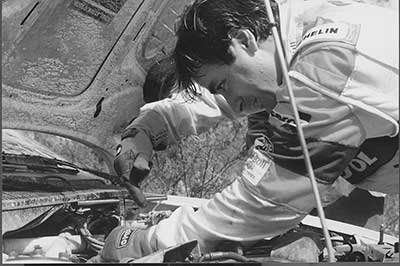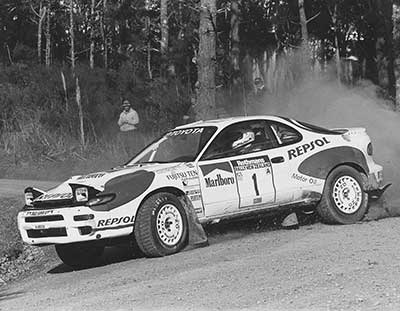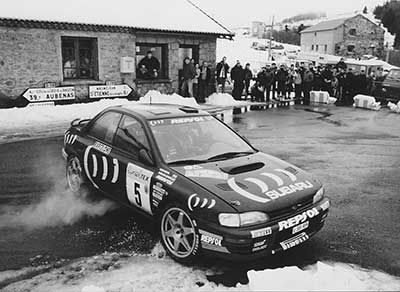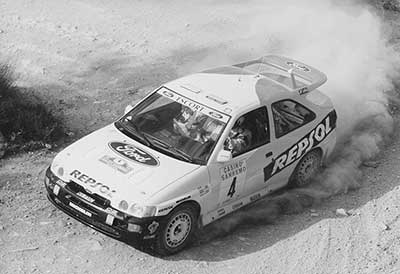15 years ago in Australian Rallysport News (the precursor to RallySport Mag), in April 2000, double World Rally Champion, Carlos Sainz, had just moved to the Ford team, and spoke to our WRC correspondent, Martin Holmes.
Hear what Carlos had to say about his move, about his shattering WRC loss at the final round in Great Britain, and on working with his new team-mate, Colin McRae.
Spain's first world rally champion, the driver who vies with Juha Kankkunen for the honour of being the most successful world championship driver, has moved this year to Ford.
Carlos Sainz's life in rallying has brought to his country for the first time an active following for the sport, which in turn has set the basis for SEAT to enter championship rallying. It was, however, only a matter of concidence and of timing, that he did not take up a career in other aspects of motor sport.
Carlos began his rally career in 1980 and it was not until seven years later before he first entered a world championship rally. But what a start! He led the first world rally he ever entered (Portugal, 1987) after the very first stage.
He arrived at the top level of the sport with the Group A era, and was personally involved in the long technical struggle to bring the level of performances experienced with the Supercars to cars which had mass production origins.
Twice he has been world rally champion and has enjoyed successful liaisons with Ford, Toyota and Subaru, and a less happy time with Lancia. In this interview he helps us understand how he is still competitive after all these years, how he approaches the sport, and gives a glimpse into where life may lead him in the future.
"I had always been fascinated with driving and had been following rallies since I was nine or ten years old, because it was in the family. I knew what I wanted to do in my life even then. It was just a matter of time before I was going to get personally involved!
"My brother-in-law Juan Carlos Onoro was already a leading driver in national rallying and his co-driver was my friend 'Juanjo' Lecalle. Juanjo had said a long time ago as soon as I was old enough to take part he would let me drive his car. I never forgot that promise and time could not go fast enough till we were able to do it.
"I think he progressively started to panic at the thought of the promise as the time got nearer, as it seemed to him I was getting crazier as I grew up."
Carlos gained his street driving licence and the promise was honoured. They entered the Shalymar Rally together in a Renault 5 TS, won their class and came 23rd overall. A most important sporting career had begun.
"I was interested in circuit races as well as rallies. I took part in one-make events with a Renault and then won the Ford Formula challenge in Spain in 1983. This meant I was invited to race at Brands Hatch for the final of the series. I was looking for money in order to progress into Formula 3 in England, but meanwhile I was competing in regional rallies round Spain with a Renault 5 Turbo.  "Then in November 1984 I had the offer to drive an Opel Manta 400 for GM Spain in Catalunya and I came second overall. That pointed me in the direction of a rally career!"
"Then in November 1984 I had the offer to drive an Opel Manta 400 for GM Spain in Catalunya and I came second overall. That pointed me in the direction of a rally career!"
The next year Carlos had the offer to drive a Renault 5 Maxi for Renault Spain as their official driver. That was his first professional contract and lasted for two years.
Apart from some Touring Car championship races afterwards and the fun of driving a Toyota GT One sports car, it marked the end of aspirations on the race track.
"I liked racing and think I would have enjoyed it. My speed was not so bad when I tried out the Toyota and I think with more practice I could have gone better.
"You enjoy what you like and I like both racing and rallying. For me I do not regret concentrating on rallying, I have achieved what I wanted. I am so lucky to be able to work in something I enjoy. Not everyone has that chance in life, and I have to thank God when I realise how lucky I have been.
"Before I was 18 I was doing squash and skiing and a lot of sports, but I prefer this involvement with cars. I was studying law and this stopped when I got the first contract with Renault."
Carlos' father was in building construction in Spain, and of course he wanted Carlos to work in the company. "
My father was disappointed because neither my brother nor myself did that. I think he did not like it when I stopped my studies, but now I think he understands.
"My brother went into the health centre equipment business and he was also a sportsman, probably not as much as me, but when we were young we were rivalling each other even though he was four years older, but I think I was more enthusiastic. We have two sisters, both married with children, one married to Juan Carlos Onoro and the other to an architect. Our family have been Madrid people for many generations."
Ford was the company which set Carlos on the world championship trail. At the end of 1986 the Group B cars (such as the Renault 5 Maxi Turbo) were banned from international competition, although still allowed to run on national events, such as the Spanish gravel championship. This prompted the first big change of allegiance for Carlos, from Renault to Ford, for 1987.
He drove at that time for Ford in Spain, though the cars were run from Britain. The Sierra Cosworth was then a two wheel drive car but by 1988 Carlos brought the team the national rally title. Ford has in many ways been a spritual home for Carlos. He returned to the team in 1996 when plans to rejoin Toyota were dashed by Toyota's enforced withdrawal from the 1996 world series, then again for 1999 when Toyota prematurely ended the Corolla World Rally Car project.
 "Sometimes you have to make quick decisions. You need to make medium term planning in your life, define your objectives, but life has taught me that plans can suddenly alter. The only thing you can do is to react correctly and be lucky to choose the best option. Life is not mathematics and things can change quickly."
"Sometimes you have to make quick decisions. You need to make medium term planning in your life, define your objectives, but life has taught me that plans can suddenly alter. The only thing you can do is to react correctly and be lucky to choose the best option. Life is not mathematics and things can change quickly."
Another decision was when in 1993 he went to Lancia. Toyota had decided to embark on a commercial connection with Castrol, whereas Carlos had long time associations with Repsol, with whom Toyota had previously worked. It was a disaster.
"My moves weren't all crises but the move to Lancia was. I had a lot of pressure to move on with reason when Castrol came to Toyota. In hindsight that was completely the wrong decision because a lot of what I had been promised, like the future development of the car, never happened."
Both moves back to Ford proved successful. "On the first occasion, we even won rallies with them at championship level when the Escort was four years old. On the Acropolis in 1997 we came first and second when people did not think it would even be competitive.
"I came back to Ford when they were still running the team from the old Ford competition workshops at Boreham, with the Group A Escort RS Cosworth, then the next year we moved to the M-Sport team. The Escort WRCar had problems, we had a new team but we all worked very hard with Malcolm Wilson and won a couple of rallies.
"Then when Toyota stopped the Corolla program I was again able to rejoin Ford, and this was at a good moment. It was very different to what I saw 2-3 years ago. There was a much bigger commitment. Ford as a company is putting a lot of effort into the championship so I am very happy, I am with one of the teams who have the greatest commitment, which is the most important thing.
"Sure, the end of the Corolla program was a big shock, but not a crisis."
When did you feel the Corolla project was in trouble?
"Quite early, already May or June last year. Didier and I swapped information when we felt that plans for the following years seemed to be on hold. More and more these fears increased until we knew in around August that the end was coming for certain."
Ford and Toyota have figured to a great degree in Carlos' career. "Both featured strongly in my career because I won rallies with them and had grown up with them at the same time.
"With Toyota I won two world championships, but it was Ford who first gave me the chance to enter the World Championship. What we did earlier with Ford (1996 and 1997) was helping them to build up what is happening now. I am happy to be back with Ford now that things are really going well, in a way which could not have been four years ago."
What special feelings do you have about Toyota?
"Toyota has obviously decided their strategy in motor sport, some how we must respect that, but I think it is a mistake because rallying is still a very important factor in motor sport. It is the sporting contact with production cars, a very strong marketing opportunity.
"I am sad because they are leaving at the best time in the history of rallying. We have never seen so many good cars in the sport. They give rallying a lot. I think F1 and rallying can be combined, I don't see why they had to withdraw just because of F1.
"With Ove Andersson I have always had a good relationship, he saw me grow up in rallying, having good battles. We are always talking and we have a special understanding. I am sure they will do well in F1. I came to Toyota in the early days of the turbocharged four wheel drive times, but they were very difficult days, because it was a young team at that level in the World Championship.
"Experience of winning specialist rallies in Africa is one thing, competing on a full program in the World Championship is another. The team was growing then. I was happy to be there at the time when Juha Kankkunen left at the end of 1989, so I could become the top driver in the team. They were good years for me and the team. Twice winning the championship, and perhaps more than ever, winning Monte Carlo for a Japanese company, made it a special period."
 There were also some dramatic times!
There were also some dramatic times!
"One of my memories was the Safari in 1990. I honestly thought I could never finish. The car was absolutely shattered. This was certainly a major part of my learning. You could not believe what happened. A large part of the route we had to recce in a Land Cruiser, for the rest we had to borrow some notes from my teammate Bjorn Waldegard.
"It was a very wet rally, and when we hit a tree I absolutely never thought we could finish the event, let alone finish fourth. That result went a long way towards my first world championship title!" For Carlos his most difficult time in his career was the year with Lancia.
"Without doubt. I couldn't prove anything at that team. I knew after 2 or 3 rallies it wasn't going to work. It was very difficult to keep my motivation."
Then of course there was that moment when Carlos lost the World Championship when his car broke down right at the end of the1998 Network Q Rally and he lost the chance of a world title. What went through your mind? How did you control yourself?
"I could see the finish board of the stage and had not been pushing at all the last day. When I realised it was all for nothing, it was very difficult, but it made you stronger in the mind. I am now prepared for anything in rallying.
"You learn from that sort of thing. I would not wish even my worst enemy to have that happen. I began to see things from different aspects. The whole thing had been such a shock, it was absolutely unexpected. I am sure that will never happen again in the history of rallying.
"I think if I was a lucky person I could easily have won two more championships by now, but it did not happen. I never feel that I have been particularly lucky in my sporting career at all: I think the good things that have happened I have deserved!
"What I can say is that I have been longer now at that level more than anyone and I think I have kept my motivation all the time."
You have worked together with almost all the top drivers in the sport. How do you work with Didier Auriol? You have had so many experiences in parallel with each other, starting with Renault and Ford, frequently driving for the same teams.
"I think everyone was expecting it would have been impossible for us to work together at Toyota, but we have proved them wrong. The first year (1998) I was leading him in the World Championship, the second year he was ahead. We are two professional drivers. When it is a matter of working you have to be mature to be in a top team like Toyota."
You seem to have a quite different character, Didier takes life as it comes, you seem to worry all the time.
"I have a reputation of having to work hard to achieve what I want, that I have to test hard to get results so I cannot be a natural driver. People don't understand I am a professional and I will work 100% at the time I am working.
"People are confused. If I am not working I will spend time with my wife, my children, my friends, my family, who I am missing a lot. I have been winning with so many different cars, winning more rounds of the championship than anybody. I was leading the Swedish after two stages on my first rally in the snow, practising with a normal car only three times over the stage. Is that someone who has got no natural ability?
"People don't understand what it takes to be professional, and that annoys me very much. If I am working, I work 100% and I want to do it and I will not play around. For me time is very important. I have my own plane because I never want to waste my time travelling and it gets me home as quickly as possible."
 How do you work with your new teammate Colin McRae?
How do you work with your new teammate Colin McRae?
"Everybody has a different character. Colin is very relaxed, not so much worrying, but he works a lot harder than people think. He knows what he wants in testing, he wants to get things right. His character is not what appears.
"He gets upset when things are not 100% and certainly when his engine breaks on the final stage! We work well together. We both try to win, but we respect each other. We are good friends. We had one problem a long time ago in Catalunya when we were teammates at Subaru (1995) when I think he did not act correctly at all.
"I get really annoyed when people say Colin gave me the victory in that rally. They don't remember who was leading the rally after two days when the order was given, it was me. I did not want team orders, it was the team who wanted team orders. They put out a press release saying that I was to win and I set off on the last day with that in mind.
"Then Colin started to push and before the last stage he said he was not going to ease off. That was not a correct thing to do. If he was going to ignore the orders he should have told me earlier."
In the end Colin incurred a time control penalty, Carlos won the event, but it was a most unsatisfactory affair.
Did you leave Subaru because of that problem?
"No, I think I decided to leave because I was not feeling happy with the team. For me it was not important just to win, I must always enjoy it. My relationship has now changed a lot with Dave Richards but at that time it was difficult and I did not think I would be happy there.
"We had good moments there, but with problems like when I fell off my bicycle and broke my shoulder in 1995, things did not turn out as we expected. I prefer to work happily with a team, even where the car is not 100% competitive, but I am content."
Teams come and go, reasons for moving on are never the same.
"I did not want to leave Toyota. The best thing about Subaru was that it was a new team coming into the full program for the first time, and we worked very hard. Before I left the team Colin and I finished 1st and 2nd in Catalunya on asphalt with Piero Liatti third, and we were also 1st and 2nd on the RAC.
"Together we helped make the team very strong. I joined the team at one level and left at a much higher level. They have a very good engineer in David Lapworth ,an excellent manager with John Spiller, good mechanics, and Dave Richards is very clever.
"In two years we had built up a good team. The win in Acropolis was good for the team, but you should not forget Monte Carlo, that is a very important rally to win. I have now won Monte Carlo with 3 different cars and I am very glad about that."
What is the Ford Focus, your current rally car, like?
"We are still learning a lot. There is a lot still to come from the Focus. I will say that from the Focus we still need to learn how to get the best out of it. The suspension is already working well but the engine needs to be improved, the gear selection and gear change also need to be improved and we need to make the car more agile.
"The fact it has a long wheelbase means it is good on fast roads, but we need to make the car more responsive. I am sure we are going to achieve that. We must work to reduce the weight as well.
"You need to get everything perfect with the cars these days. Small things can make a car a winner or a loser. The process of preparation of the car is now much more important than before. Rallies are shorter, differences are smaller, power is the same for everyone. Suspension, transmission and other details are therefore more important than ever."
Looking back, is there any one favourite car in your career?
"I enjoyed very much the Toyota Celicas. The Subaru Impreza became a very easy car to drive at the end of my time with them. I did not enjoy my time with the Lancia Delta and I also did not enjoy driving the Toyota Corolla. I did not think the Corolla suited my driving style very much, but we got good results.
"The problem with Lancia was the way it was not developed. The car itself was good. It had won a lot of rallies the previous year, but I never had the chance to enjoy it.
"With the Corolla we were struggling with the short wheel travel in the suspension. When the surface was good the car was good. On tarmac the car was good. As soon as it was a little rough it was difficult to drive."
And what happens to Carlos Sainz from now onwards?
"Maybe I am starting to look older because more people are asking me. I am still only 37 and I still enjoy the work which is the most important thing.
"I like driving, I am still reasonably competitive. You cannot fix a date for making changes in life, but I would not think I will be active for a lot longer. When I stop driving I would like to be involved in other areas of motorsport afterwards - it has been my life, it is what I know.
"On the other hand I am doing so much more than just driving nowadays. I have started an aviation company in which we are now running three private jet planes, an indoor go-kart track in Madrid, I am starting a very good gym in Madrid and I am working with the Spanish junior rally team, which is now going to work with Ford. We are looking for a good program for them.
"I am sure my life will not be completely cut off from motorsport."
- Martin Holmes, April 2000

